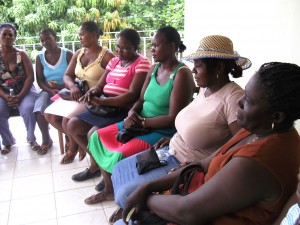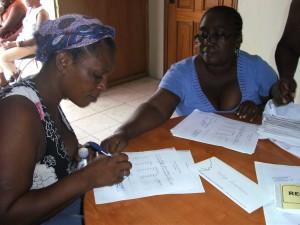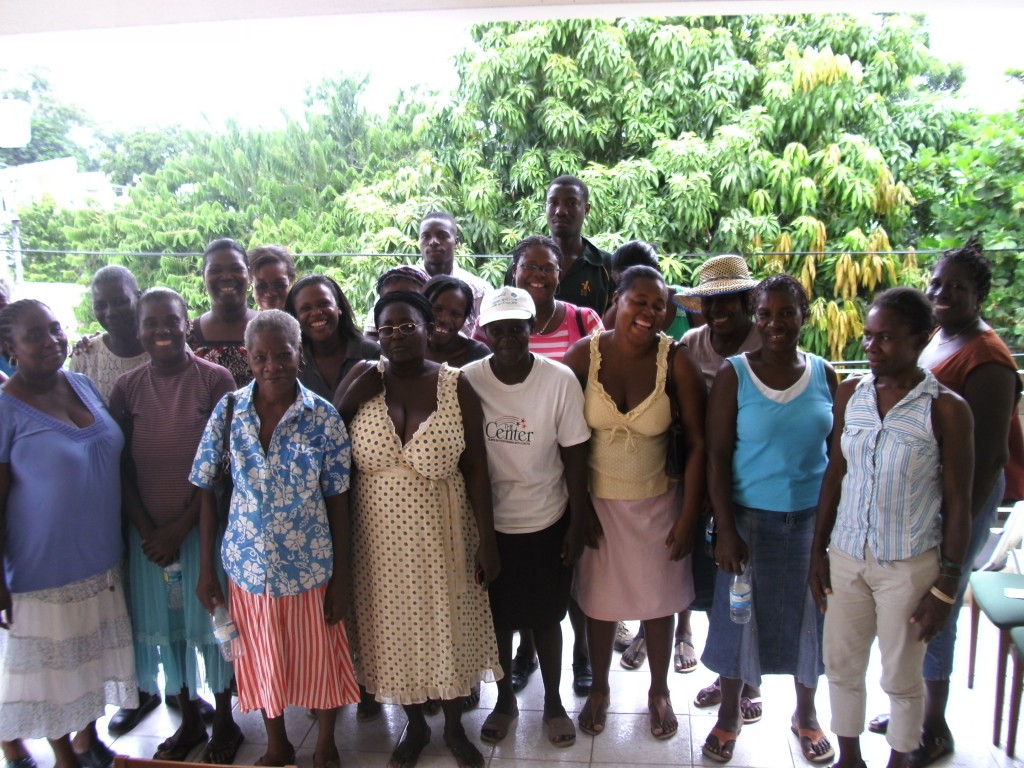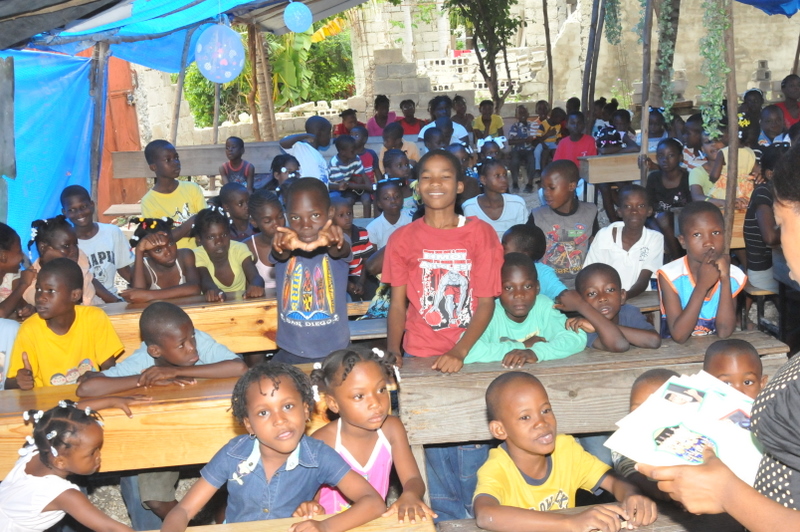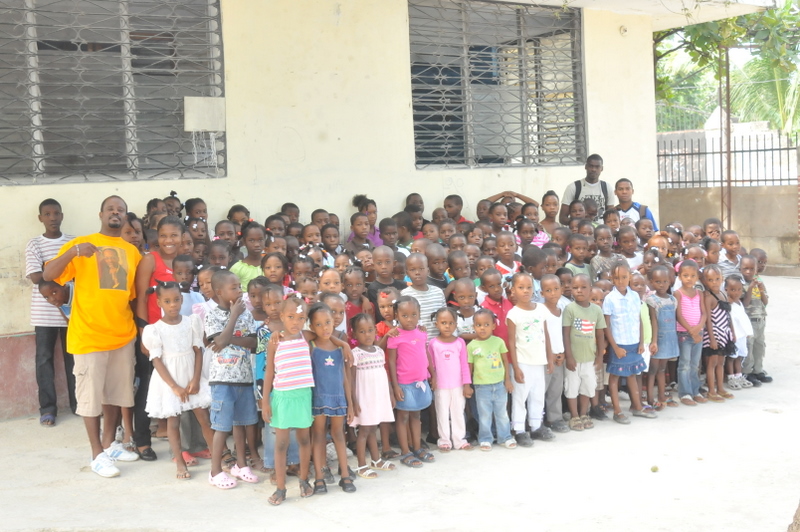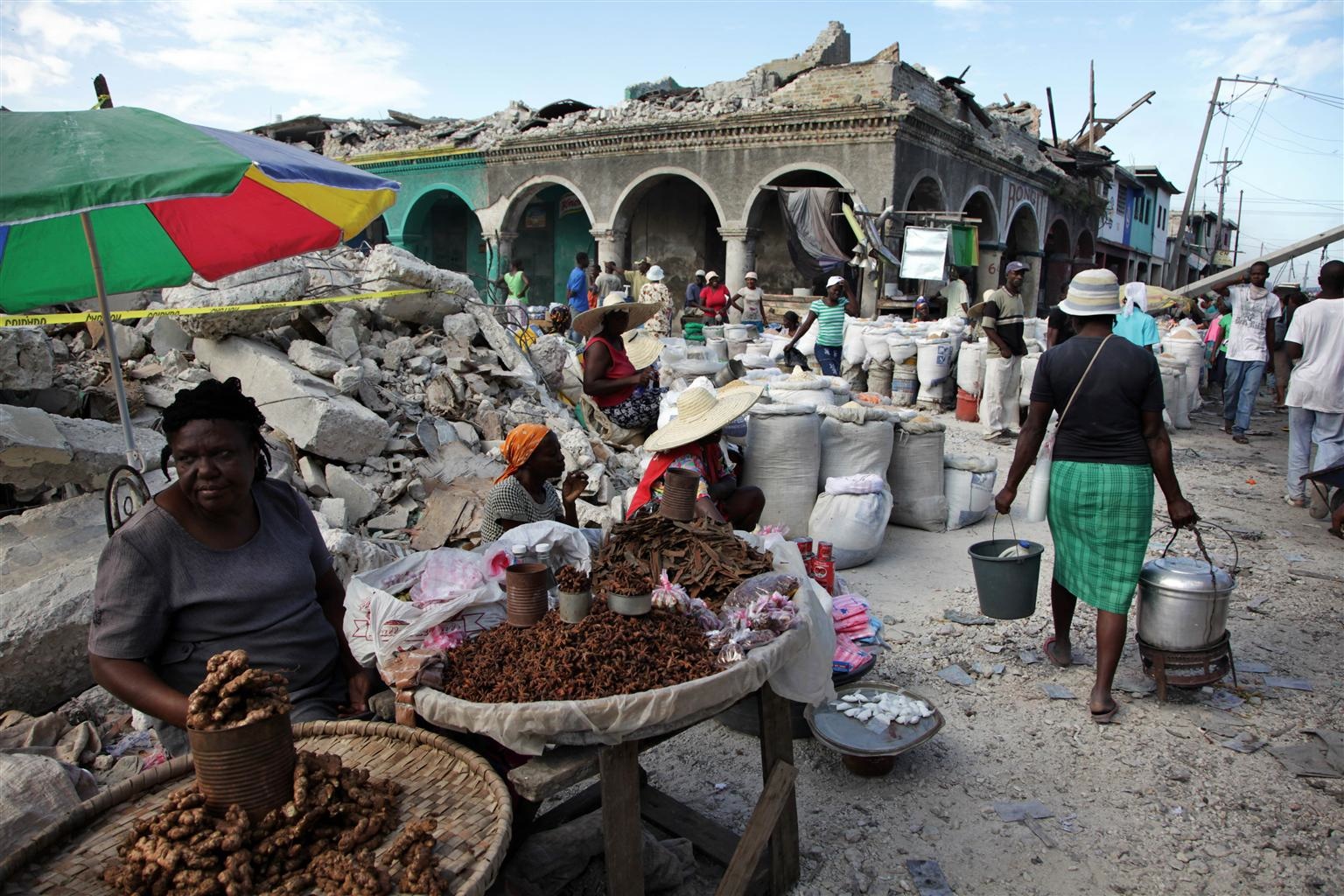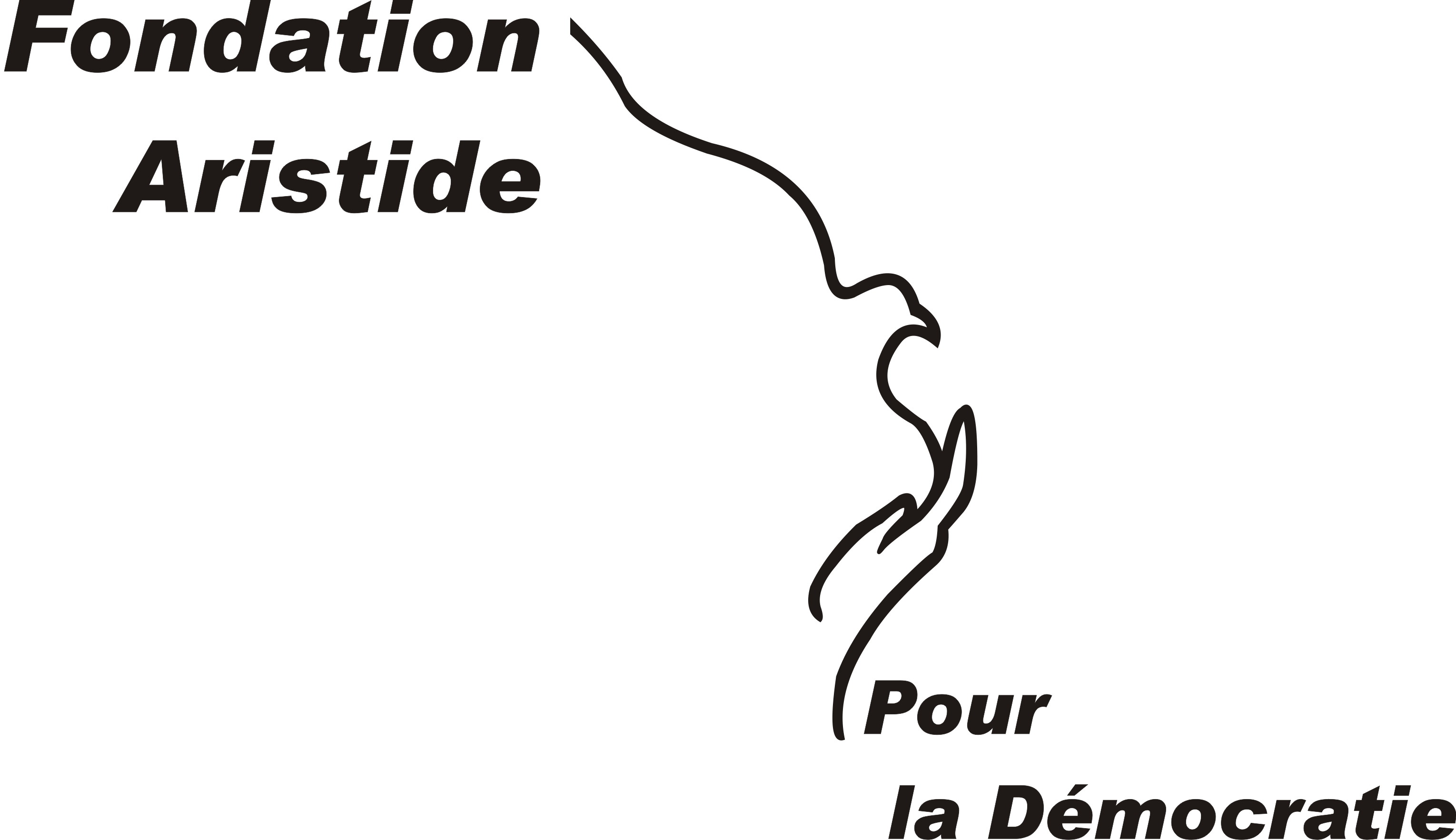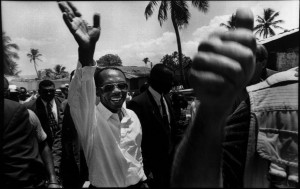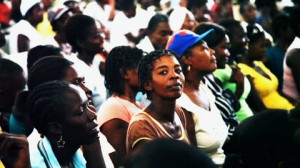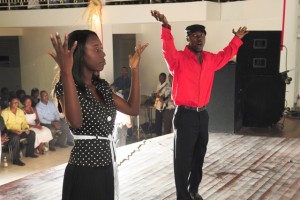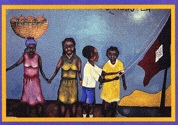Market Women – the Heart of the Nation
Marie José Paul, a recipient of a loan from the Aristide Foundation, in front of her business.
This past August sixty market women gathered at the Aristide Foundation for Democracy to plan and discuss the opening of a micro-lending initiative. The earthquake had a devastating impact on the small businesses of the woman gathered. Many had lost homes, businesses and/or inventory. Almost all were living in tents or other temporary housing and lacked the funds to restart any commerce to support their families.
Since its inception in 1996 the Foundation has worked closely with women in the informal sector, making loans, selling food at low prices, and helping them to build organizations to advocate on their behalf. This summer with assistance from Haiti Emergency Relief Fund the AFD launched a women’s micro-lending project with a small loan fund of $7,000. A first group of 20 women received further training in early September, after which loans were made on September 8, 2010. Each woman received a loan of 12,000 gourdes ($300US). Interest on the loans is 5% (bank interest rates are 20%-30%). The loans are for a five-month period, with early repayment allowing them to pay less interest. The project is directed by Gladys Delouis, a long-time organizer with the AFD, and overseen by Director Toussaint Hilaire.
The 20 women who received loans sell their goods at the markets of Croix-des-Bouquets, Croix-de-Missions, Croix Brossals (the main market in downtown Port-au-Prince), Tabarre and Cite Soleil. The small businesses they launched with the loans include: selling cooked food by the plate (manje kuit), selling raw food (manje kri), fried snacks (mange fritay) as well as selling charcoal (marchand charbon) and clothing (marchand vetman). A couple of the women in the group, who live in La Plaine and have access to land, borrowed money to plant quick growing food stuffs which they plan to harvest and sell. Of the 20 women who received loans, 17 are the sole providers for their families.
The markets where these women sell their goods are the commercial hubs of their communities. In these markets, and many others across Haiti, thousands and thousands of men and women work, and many more thousands of Haitians buy their daily necessities. Historically, the markets that serve Haiti’s poor majority were ad-hoc, unplanned, and dirty. While Aristide was President from 2000-2004 fifty-three public market places across the country were constructed or repaired—including all of the markets listed above, where the women in this project work. Clean and dignified stalls were created for vendors, roofs, drainage, and toilets were put in. Public literacy centers, and medical clinics were set up inside the markets for the benefit of both sellers and customers. Since the coup in 2004, most of these facilities have fallen into disrepair because the state does not bother to maintain them. Programs like the marketplace literacy centers and health centers were abruptly abandoned—facts well know in on the ground in Haiti, if virtually ignored internationally.
Since September, the 20 women in the micro-lending project have been meeting at the Foundation every 15 days, to check in, share ideas and continue to shape the program.
Mobile Schools Continue in Nazon, Fontamara and Tapage
One month after the quake, the Aristide Foundation opened mobile schools in five refugee camps across Port-au-Prince. Throughout the spring these schools held open-air classrooms led by young high school and college graduates, offering a refuge for children who survived the quake. The schools gave the kids a safe place to go each day to relax, learn and spend time with supportive adults in the midst of the utter calamity they were living though. The mobiles schools served 1,200 children five days a week and employed 100 young Haitians during the first few critical months after the quake.
By summer as schools across the city began to slowly reopen, we ended the full time mobile school program. We had never intended the project to be permanent, and we did not have the funds to keep the schools open indefinitely.
However, in Nazon (central Port-au-Prince), Fontamara (Carrefour) and Tapage (La Plaine) the monitors along with the parents and members of these communities decided these schools were so important, and the collaboration was so successful, that they determined one way or another to keep the schools going on their own.
Together We Are Strong
Watch a New Video on the work of the Aristide Foundation since the
January, 2010 Earthquake Together We Are Strong
While the international press on Haiti has been abuzz with stories about Haiti’s upcoming Presidential elections, there is not much enthusiasm on the ground, where over a million and half people are still living in tents settlements across Port-au-Prince and the other areas hit hard by the quake.
Nearly every Saturday the Aristide Foundation holds a democratic debate were ordinary Haitians can gather and voice their views. These gatherings continue to draw participants from across the metropolitan area, the majority of whom are living under tents. What we hear from those coming to the AFD is disinterest in elections from which the largest political party in the country Famni Lavalas has been excluded, anger at the recovery process which has made almost no visible signs of progress in over 7 months and which offers no role for the majority of Haitians to participate, and a sustained call for the return of former President Jean-Bertrand Aristide and his family to his country.
For a full analysis of the political situation please see Haiti Elections: Unfair and Undemocratic by Ira Kurzban (Miami Herald September 8, 2010). To support Haitians call for the return of President Aristide add your name to this petition.
As we enter the eighth month since the quake the Foundation has begun to switch gears from the immediate relief efforts (mobile schools and mobile clinics) which we activated in response the catastrophe. We’ve begun to focus on more durable long-term projects including:
- An agriculture project on the grounds of the UniFA campus which will put formerly agricultural land near the city back into productive use, and which will provide children from the mobile schools we operated in the wake of the quake a chance to learn agricultural skills and raise food for their families.
- A micro-lending project to enable market women who lost their goods and businesses during the quake to restart their businesses and support their families.
- The reopening of UniFA, the University of the Aristide Foundation. The main classroom building, which sustained minor damage in the quake, has now been fully repaired. On September 1, 2010 computer science and Spanish language classes resumed inside the building. Over 300 young Haitians are now studying computer science on the campus. During the second week of September, 296 students how began their studies in the Spring of 2009 will complete their one-year Spanish language program. For the past several months, while the building was being repaired classes were held in open-air classrooms on campus, allowing students to continue their studies. For more on the reopening of UniFA please see the article which appeared in the Nouvelliste on Spetember 8, 2010 (French-language)
All the students currently studying at UniFA, and the thousands more who would like to join them, along with everyone connected to the Foundation, look forward to the day when UniFA can offer a full range of University-level programs to the children of the poor, including the reopening of the Faculty of Medicine which functioned from 2001-2004. With twenty-eight of thirty-two institutions of higher education in the country reportedly destroyed, the urgency of reopening and expanding the University to meet the incredible demand of Haiti’s youth could not be greater. We hope you will join us in finding the resources to making this dream a reality.
If you would like to support the work of the Aristide Foundation for Democracy tax-deductible donations can be made here:
Or mail checks to: Aristide Foundation, PO Box 490271, Key Biscayne, Florida 33149
All donations are tax deductible and will be acknowledged.
